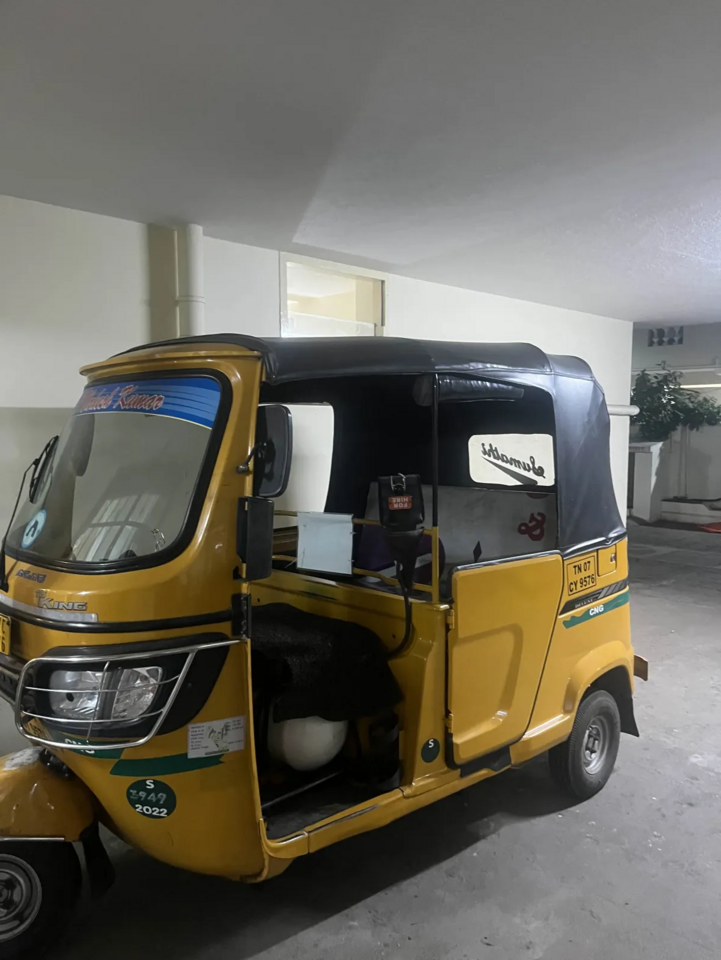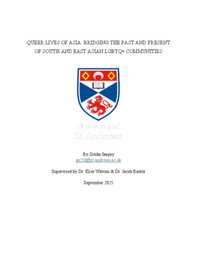Queer Lives: Narrations of Work Abroad (June 7)

I have only one goal for today: cut my hair.
More specifically, get my hair cut. More specifically, chop at least three inches, so my bangs preferably fall above my eyes and not to my nose, and the incredibly questionable mullet I’ve recently acquired morphs back into something more respectable. I run my hands through it as I stare in the mirror, toothbrush wedged under my tongue, and see if the longest strands touch my shoulders. I usually keep my hair short, curling just onto my neck and sitting in layers over my forehead, but I've lost track of time, and now, six months after my last cut, it’s a thick dark mess that refuses to be styled.
Thankfully, I already have an appointment booked at a nearby salon, so I pin it up as best as I can and head out to the living room. It’s funny – I’m not usually this fussed over grown-out hair, but this time around I find myself watching the clock, trying to mentally force the day forward until it’s time for my appointment. I feel restless, I think, driven off-balance by the stress in my family and the general exhaustion of travel. In the midst of emergency, I’m living my days with a sense of normalcy, but the constant feeling that something is wrong is unshakeable. Cutting my hair, however small an action, feels like a sense of control. I’ll feel like myself again.
I spend the early hours of the day reading, enthralled by a murder mystery set in 1920s Bombay. The story follows a young female lawyer, Perveen Mistry, as she investigates the unexpected death of a student who had come to her for council only hours before her untimely death. While the story itself is interesting, what truly delights me are the descriptions of the place. I’ve spent so many days now attempting to capture Mumbai in all its truth: the bright, the run-down, the familiar, the unknown. I could write circles around it, grasp at any number of metaphors and analogies to try and translate my experience into words. It is delightful to read a new take on the city, one that tries to recapture the delicate balance of colonial life. I am soon lost in the setting, imagining the crowd-lined streets during British processions, the grandness of the Gateway, and the delicate patterns of green silk sarees. Somehow, the murder becomes secondary.
Sitting and reading by the window, a gentle breeze whispering against my spine, I am reminded once more of how much quietness can be found here. The city is loud, make no mistake. I step out onto the market streets, and I am immediately overwhelmed, distracted by the sheer presence of colour and sound and sight and smell. But amongst that all there are moments like this – legs swung over the balcony, head tucked behind a curtain, entranced by a cheap paperback I picked up at the local bookstore. It’s exactly these memories which stick with me when I’m not here. I may not remember every building I see, or recall every new fact or figure, but I remember peeling lychees at the table with Revathi Auntie, and the feeling of sun on my eyes as I wake up. Hours upon hours reading. I lose myself in it.
As afternoon dawns, I am shaken out of my stupor by Revathi Auntie for a short lunch of rice and beans sabzi. Afterwards, she heads inside to take a nap – I've been keeping her up far past her usual bedtime the last few days, as she jokes – and I throw on my shoes. The salon I’m going to isn’t far, only a fifteen-minute walk, but it’s the first time I’m really going around the neighborhood by myself. The walk, however short, brings me a newfound sense of independence. There’s a shift, ever-so noticeable; this isn’t a city I’m visiting anymore, but a place I’m learning. It reminds me of an excerpt from Joy Sullivan, a poet who wrote a series of verses about my beloved California. I read them, every now and then, whenever I’m missing the redwoods and the warm sands of the Pacific. She writes in one section about trail directions – about how a friend tells her to either walk towards the tall pines, or turn into a field of golden poppies, running wild above the valley. She asks her friend which road to take, and her friend responds with a shrug: either way, she says, it’s all heaven. Every road is a bit lonely, and every road is worth taking. The only mistake you can make is not walking at all.
Missing California is a strange feeling, honestly. For me, homesickness is usually centred around people; I miss my amma, I miss my appa, I miss my best friend. Living across the world, I am not unfamiliar with the feeling of missing someone deeply, and the last several weeks have been especially acute. It's funny how you can go months without seeing someone, but it’s the last two weeks that’ll really kill you. But distance, in my experience, has always been about missing people. Recently, though, perhaps driven by the unexpected distance from my family or the challenges of settling into a new place, I’ve been thinking a lot about my home state. California is genuinely one of the most beautiful places in the world, I think, and even though I don’t live there year-round anymore, I still love it dearly. I see it everywhere, as I walk down the tree-shaded streets. The distant crash of waves, the packed cafes – even the unending traffic. I suppose we always search for reminders of home when we’re far from it.
The haircut itself is short and blissfully convenient; I’m thrilled as I watch myself in the mirror, and even more delighted to find that my head feels fifteen pounds lighter than before. The overbearing philosophy that dominated my thoughts on my walk up is thankfully absent during my return, and I spend the time counting cats and looking out for all the hidden murals, tucked away behind buildings and on brick walls. If it weren’t thirty-seven degrees out, I’d keep walking, on and on until I hit the seaside. I feel as if I could walk forever here, exploring the corner streets and ducking into the veranda-covered shops. There’s always a doorway to be crossed. Maybe I’ll come back tomorrow and see what it has to offer.




Please sign in
If you are a registered user on Laidlaw Scholars Network, please sign in